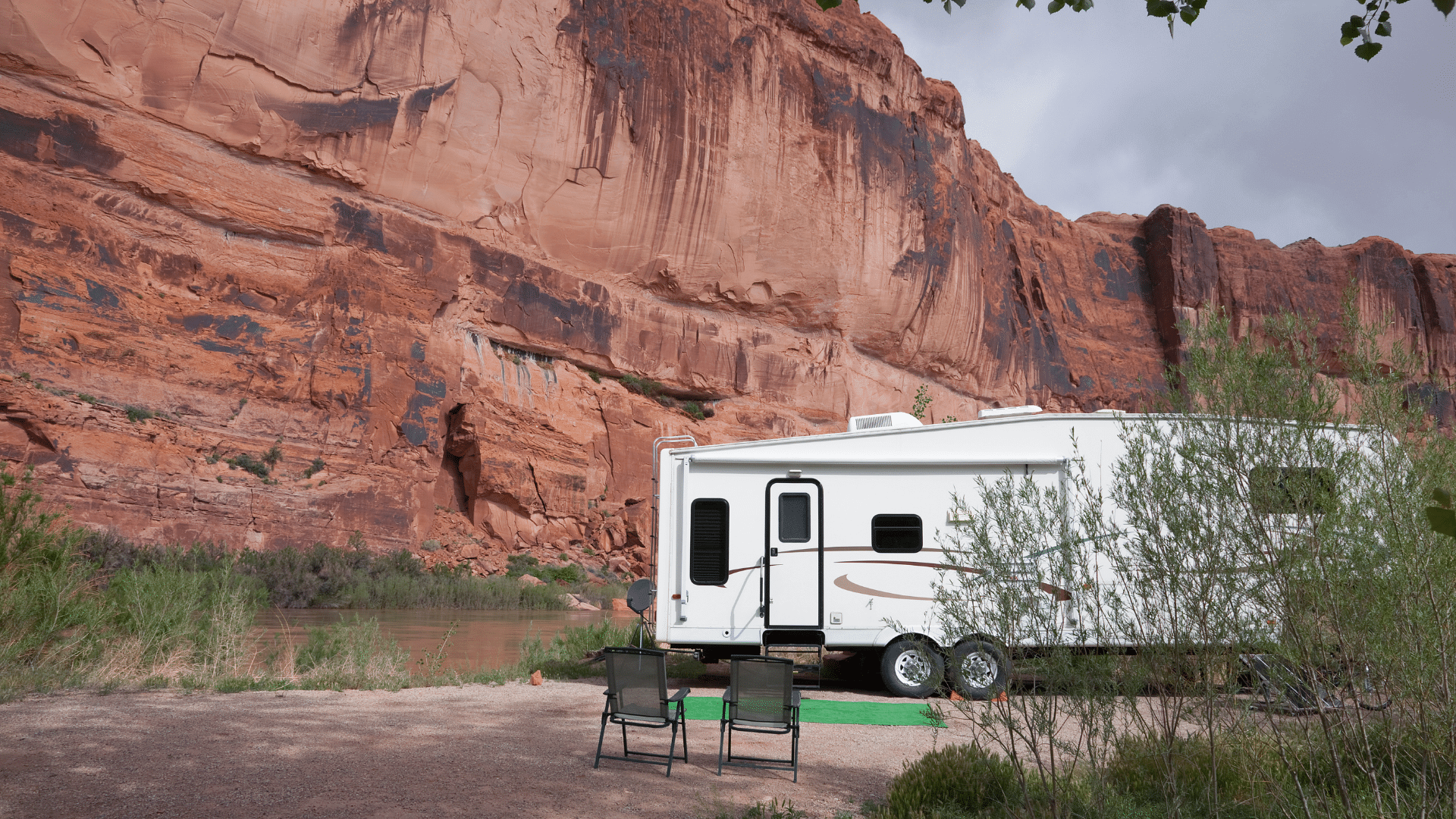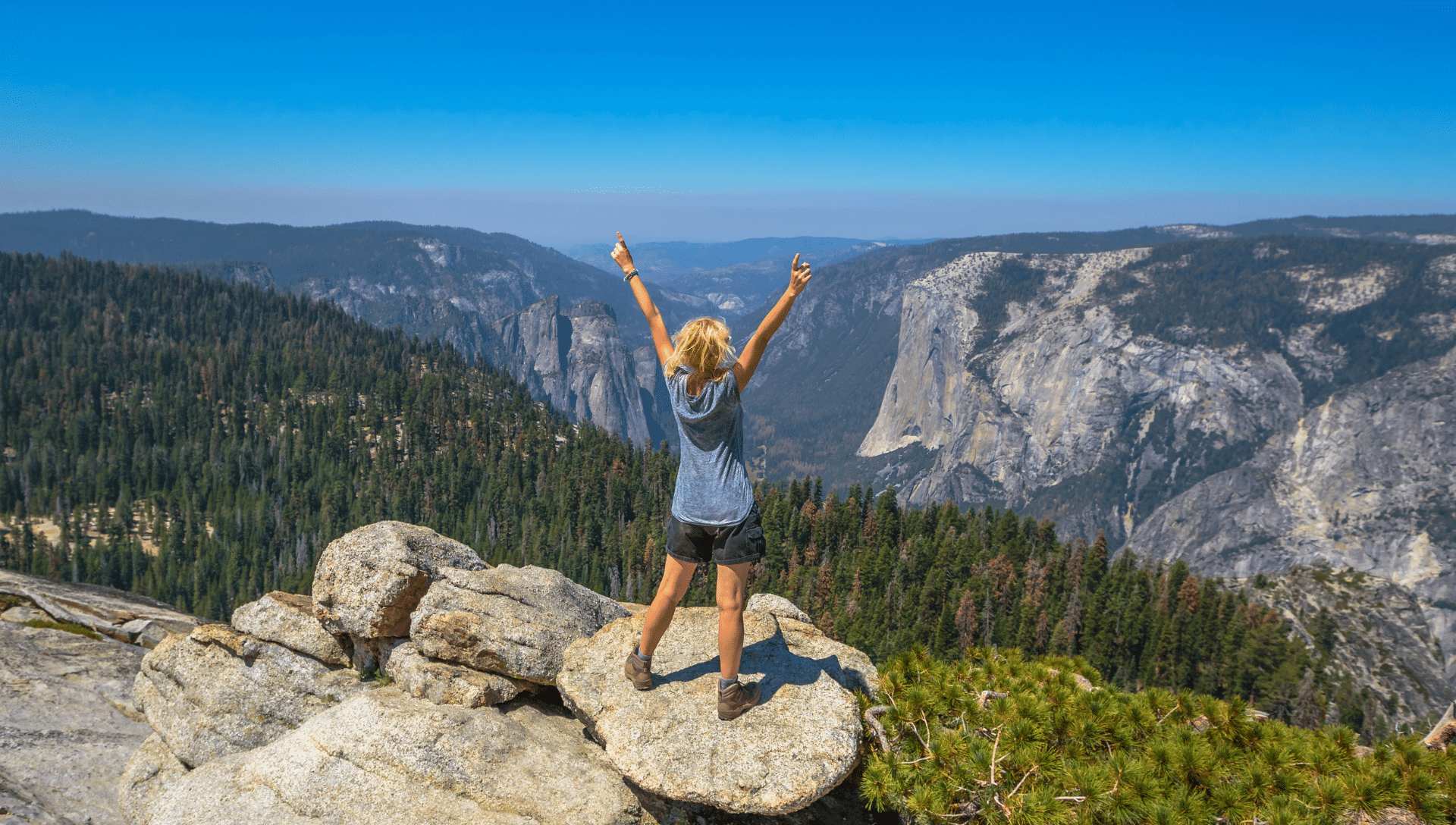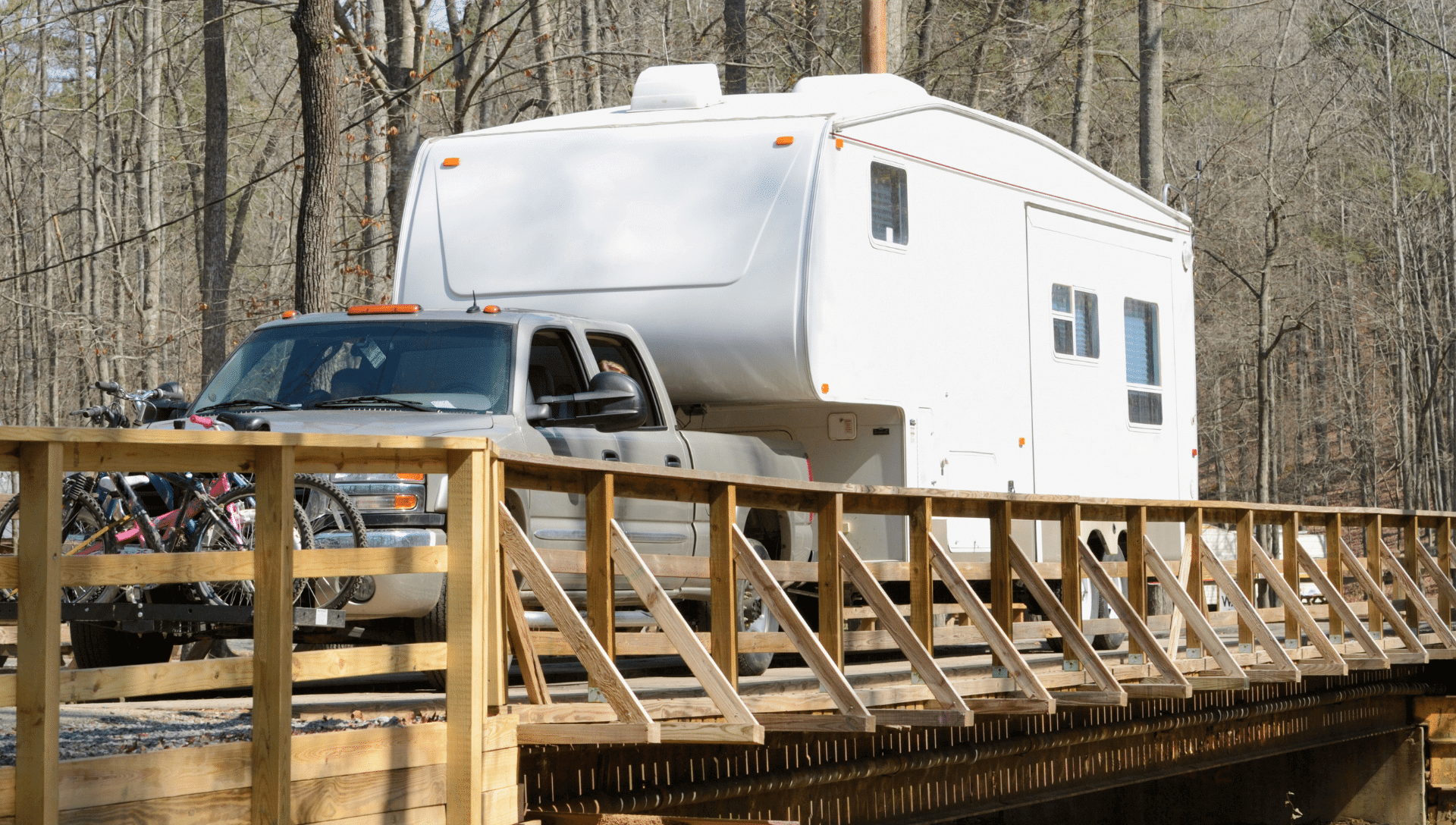Table of Contents Show
Camping at RV parks has its perks. The main one being convenience. You usually have full hookups, amenities, and superior level sites. But with all these bonuses there are some drawbacks. The most significant downsides to staying at an RV park are cost and crowding. Depending on where you go, you’ll have to pay a pretty penny and get packed in with all the other RVers like sardines. To avoid these, it’s time to learn what is dry camping and how you can do it!
If you dream of camping off the beaten path and reconnecting with nature in peaceful, serene, and usually free sites, keep reading to learn all about what dry camping is.
What is Dry Camping?
Dry camping and boondocking are a little different, but there is a lot of overlap between the two. Therefore people often think they are the same thing. Dry camping means you are camping without hookups; this typically means a primitive or undeveloped site at a state or national park.
In other words, a campground that doesn’t offer hookups. Boondocking will involve dry camping (that is, you don’t have hookups), but you are not at a developed campground.
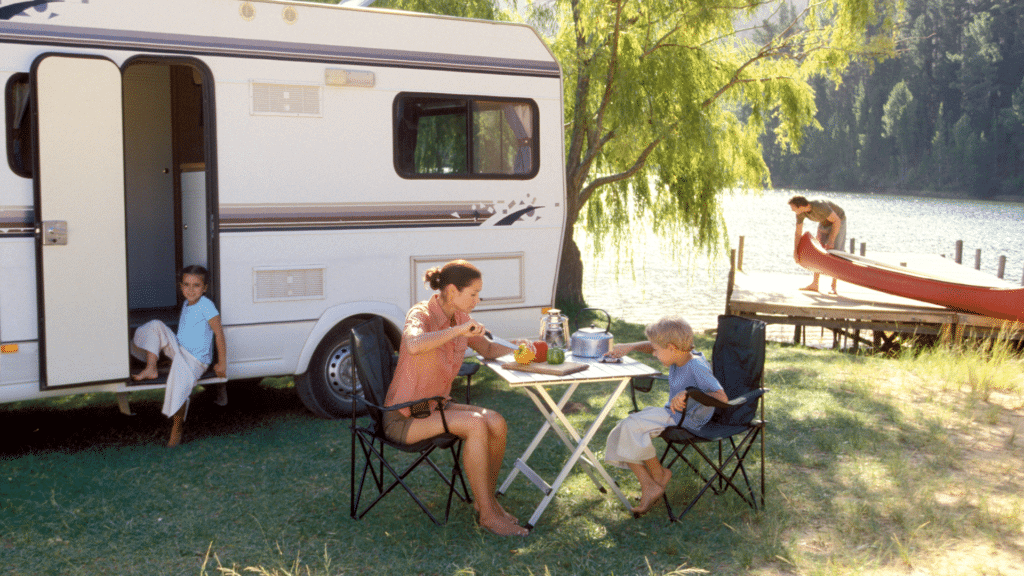
Essential Items For Dry Camping
When you are going dry camping for the first time, there are several essentials you need to have to ensure a good experience.
Full Freshwater Tank
When you are dry camping, you won’t have any hookups. No hookups mean you will need to start with your freshwater tanks filled.
The water you have in your freshwater tank is all the water you will have for the duration of your dry camping experience.
You will use this water will for drinking, cooking, showering, using the bathroom, washing dishes, everything.
Empty Waste Tanks
Because you won’t have a place to dump your tanks when you are dry camping, you want to make sure you empty your waste tanks, including black and grey water tanks, before hitting the road.
This ensures your tanks won’t get too full and back up on your trip. Yuck, no thanks!
Store and Pack-out Your Trash
Most places you will dry camp won’t have a place for you to toss your trash out every few days as an RV park does.
The longer you are staying somewhere dry camping, the better system you must-have for this. If you are dry camping for an extended period, make sure you have somewhere to store your trash, such as heavy-duty garbage bags or a tote with an airtight seal.
Suppose you have room to store this in an outside storage compartment within your rig, even better. That way, your trash won’t stink up your entire RV.
Ensure you don’t just store your waste outside, though, or you’ll almost certainly have animals sniffing around. And I don’t know about you, but I don’t want any bears coming to visit me when I’m out in the boonies.
Electrical Setup: Solar and Batteries or Generator
Dry camping also means you won’t have access to shore power. You’ll need to run off solar power and battery banks or a generator.
It can happen without these, but having the proper electricity setup will make for a more enjoyable dry camping experience.
The most important part of your electrical system is your power storage aka your batteries. The more storage space (Ah) you have, the longer you can run things in your RV. Lithium batteries provide the most storage space for the least weight and space.
Battle Born Batteries offers a full line of lithium-ion batteries. Whether you simply want a drop-in replacement for your current battery or want a reliable off-grid system for some serious boondocking, they have you covered. We've used and abused our Battle Born Batteries for years and can confidently say lead is dead.
5 Tips for Dry Camping
If you want to know how to dry camp the right way, here are our best tips.
1. Practice With Shorter Trips Closer to Amenities
Before you decide to take off on a 2-week dry camping adventure, we recommend practicing first. If you don’t know what dry camping is or you don’t know how to dry camp, it isn’t as simple as it appears at first glance.
You don’t want to find yourself in the middle of nowhere with no freshwater left, overflowing waste tanks, and a generator that doesn’t have enough gas to turn back on.
To avoid this, try some practice trips that are both shorter and closer to amenities. That way, you can get a gauge for how quickly you go through your supplies. And in the worst case, you can take a quick drive to town to find a dump station or refill.
The more you practice, the better you will get at conserving resources so you can camp for longer and longer, which brings us to our next point.
2. Conserve Fresh Water
Freshwater is your friend, especially when you are dry camping. Most of us are used to the luxury of a seemingly endless supply of running water. But do you know how much water you use over a few days or a few weeks? It is probably more than you think.
Conserve freshwater by turning off the faucet when brushing your teeth, scrubbing your hands or dishes with soap, etc.
Another way to conserve freshwater when dry camping is to minimize the number of dishes you use when cooking or eating. You could even opt for paper plates (or even better, a biodegradable plate) so there are no dishes at all.
If you have dishes, washing them in a bucket of soapy water and then only using water from the faucet to rinse will help you save too.
And last, shower less often (or elsewhere, such as an outside shower with biodegradable soap).
3. Shower Less (or Elsewhere) To Conserve Tank Space
Not only does showering use a lot of your freshwater, but it also quickly fills up your grey water tank. Your gray water tank may be smaller than your freshwater tank, so taking even a few showers will soon fill it.
If you are dry camping at an RV park with no hookups, you may shower in the bathhouse to conserve freshwater and tank space.
You could also shower at other places while you are out and about, such as truck stops, a gym you have a membership to, etc.
If you equip your rig with an outdoor shower, this is also an option. You could even go really “old fashioned” and bust out a shower bag. Just make sure you are aware of your surroundings and use biodegradable soap or just rinsing if you go this route.
4. Keep Your Batteries Charged
Dry camping means no electricity hookups. The good news is, there are several alternatives. When you drive your RV, your batteries get charged. But if you are dry camping for a few days, you’ll be stationary, and so you won’t be charging your batteries while you drive.
The battery will let you run the lights and water pump and possibly the radio and TV. But if you want to plug-in appliances or charge your cell phone, you’ll most likely need a converter and a more significant power source.
Two of the most popular ways to keep your batteries charged and get additional power to your rig while dry camping include a gas generator and solar panels.
A generator will provide AC power, so all you need to do is run the generator, and you can plug in your devices as usual.
Keep in mind; your generator needs to be powerful enough to run all your systems. For example, if you want to run the air conditioning, you’ll need to have at least a 3500-watt generator.
If you don’t want the noise that comes with a generator, another option for power when dry camping is solar power. Solar power will keep your batteries charged, but it doesn’t provide on-demand AC power as a generator does.
Solar energy isn’t enough to run energy-sucking appliances such as the air conditioner, electric heaters, microwave, etc. But depending on how many solar panels and batteries you have, this is an efficient way to generate power off the grid (as long as you go somewhere sunny)!
5. Always Pack Out Your Trash
Last, when you are dry camping, don’t be the person who leaves their trash when they pack up. Do we need to say more?
If you bring it in, pack it out so we can all continue to enjoy nature and access to free camping.
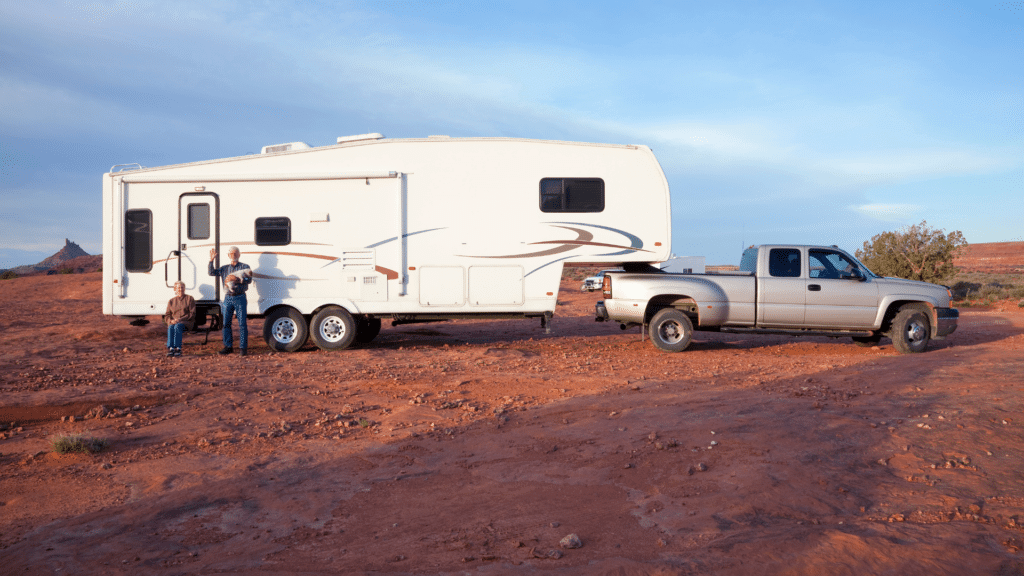
Conclusion
Now that you know what dry camping is, we know you’ll be excited to give it a try. Although dry camping requires a bit more work and planning, it is so worth it.
There is nothing like connecting with nature with few or no other people around. So, when you plan your next few RV trips, we’d recommend you give dry camping a try.




